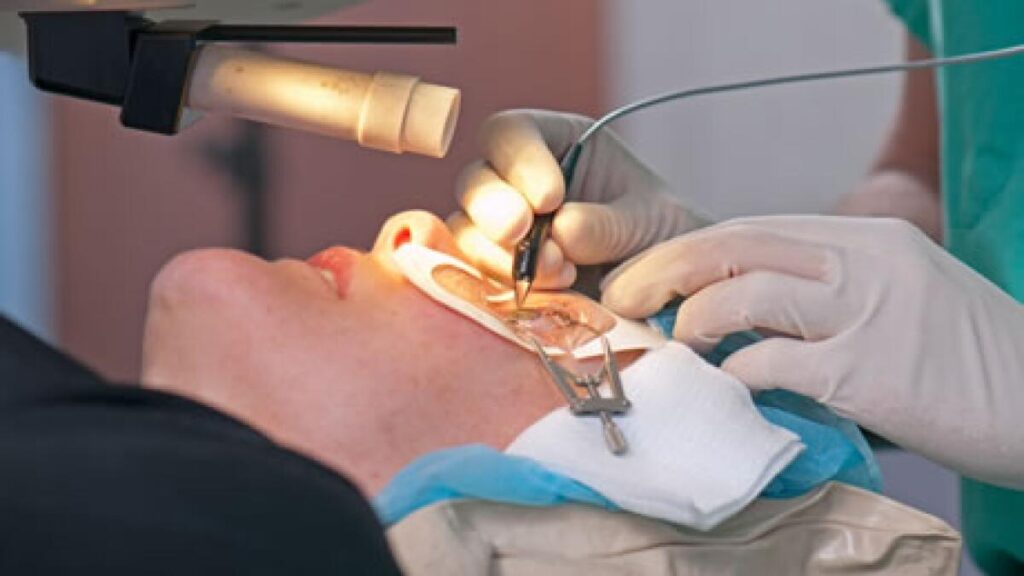LASIK eye surgery is arguably the most remarkable medical innovation of the present day technology, eliminating the need for glasses or contacts and restoring near-perfect vision for tens of millions of patients. It is still a surgical procedure, and your future vision depends on selecting the most qualified, skilled, and experienced LASIK surgeon in your neighbourhood.
Finding a good LASIK surgeon is among the most critical steps you will take if you have been diagnosed with sight problems and are considering a vision correction procedure like lasik eye surgery. Since everybody is different, knowing the exact thing that works best for you regarding personality and approach is essential. Getting that grit feeling: “Yes, you must be able to say: this is the expert I trust, who can give me the confidence to proceed and help me achieve my vision goals” is extremely valuable.
5 Things To Ask When Choosing your LASIK Surgeon
Several recently posted reports on the Internet explain what makes the best LASIK eye surgery candidate, but the qualities that define the best LASIK surgeons are even more critical. The surgeon’s profile, credentials and current licensure are the foundational places to start. And, you must have verified every detail online to be double sure.
Your preferred LASIK surgeon must be a board-certified ophthalmologist. Once you have verified that, look a little deeper to ensure your eyes get the safest LASIK surgery, diagnosis, and long-term follow-up care they deserve.

How many LASIK procedures has he performed, and how many does he perform surgery each week?
While we acknedlege the fact that every one of us would start our career journey somewhere, it is also true that the doctors’ experience, reviews and track records should speak volumes for themselves. Preferably, your LASIK surgeon must have completed at least 10,000 procedures in his entire career. Also, he should perform them regularly, which indicates their skills are top-notch and recommendable.
One of the most critical questions you can ask your soon-to-be surgeon is, “Have you ever rejected a patient’s request for LASIK eye surgery?” if the answer is ‘Yes’, you are on the right track. It shows the surgeon knows the rules and regulations of the procedure. The reality is that not everybody is a good LASIK eye surgery candidate. Exclusions include diabetes, immune system disorders, or rheumatoid arthritis.
If the surgeon says he has never rejected a patient, it might mean that he loves money more than the patient’s overall well-being and long-term success, and that is not the right surgeon for you. The right ophthalmologist will always prioritize your health and safety above all else.
He must have successfully treated numerous patients with your vision diagnosis.
LASIK surgeries can correct many vision problems, including far-sightedness, near-sightedness, astigmatism, and more. Your surgeon should have experience using LASIK surgery to treat patients with the same type and vision impairment successfully. Knowing that your soon-to-be surgeon has performed thousands of successful LASIK surgeries on patients with similar vision problems will give you peace of mind.
When choosing the right LASIK surgeon, do not base your decision on the cost
Beware of prices that looks too cheap. When selecting the right LASIK surgeon, some may offer you bottom-dollar pricing, but you don’t have to sacrifice the excellence of the procedure and post-surgery care for a discount. Equally, some surgeons may provide you with what seems to be an attractive discount but instead offer terrible service.
What feelings were you left with after your consultations?
You should schedule LASIK eye surgery consultations with your region’s two or three competent surgeons. In addition to providing more opportunities to understand the procedure and what you should expect, you also can get a feel for their office space, staff, and the surgeon.

While you are there, take the time to evaluate and ask yourself the following questions:
- Are the staff members friendly?
- Was the consultation with the surgeon educational and informative? Or did he appear more like a salesperson?
- Did you feel calm asking your questions? Were the answers understandable?
- Did you feel seen, listened to, safe, and cared for?
Always honour your grit feeling. If the office space offers “all of the greatest and latest” in LASIK technology, but you do not feel comfortable, or the surgeon seems untruthful, your search is not over. Only trust your vision to an ophthalmologist who has gained your 100% trust without remorse.
Do they offer the most suitable laser procedure for you?
There is nothing like size fits all procedure in vision correction. The options include LASIK, implantable contact lenses, refractive lens exchange and PRK. Your surgeon should be transparent about which procedure is best to accomplish your desired vision correction and whether or not s/he can perform the surgery.
The Best Three Tips for Finding the Right LASIK Surgeon for you
Here are three tips for finding a perfect LASIK surgeon:
- Do thorough research. The Internet, your local chamber of commerce, and medical organizations like the American Academy of Ophthalmology and the American Society for Cataracts and Refractive Surgery are all excellent resources.
- Get referrals from family and friends who have had the procedure. Talk to them about their experiences. It is also a perfect idea to speak with your physician and optometrist to get their input and perhaps even a referral.
- Once you meet a qualified surgeon, get additional references and recommendations from current and past clients who can discuss their capability with the particular surgeon and practice.
You want the most competent surgeon to help you achieve your ultimate vision correction goals and expectations, so put in the effort to find the right surgeon that meets your needs.
In conclusion
Beware of a surgeon who over-promises. LASIK eye surgery is a terrific option, but there are boundaries to what it can achieve. For instance, it may not give you perfect vision, just better vision. And since your eyes will continue to change, you might still need reading glasses when you’re older. Your surgeon should be upfront about these limitations, including what you should expect for how long LASIK lasts, LASIK risks, what to expect with LASIK recovery, and more.
